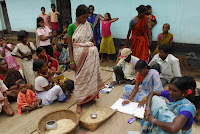As the world marks International Women's Day, we ask what's its relevance.
That's not to say it's not relevant, simply that there's a big difference between the plight of women who are oppressed and abused in many countries of this world, and the, arguably, relatively subtle differences in pay and opportunity that upset some activists about the United Kingdom.
 In many countries women still struggle to be born. It's not long since Hilary Clinton led women to Beijing in China for an international women's conference. Yet the Chinese writer Xinran Xue has documented the impact of that country's long-standing "one child" policy.
In many countries women still struggle to be born. It's not long since Hilary Clinton led women to Beijing in China for an international women's conference. Yet the Chinese writer Xinran Xue has documented the impact of that country's long-standing "one child" policy.Her book Message from an Unknown Chinese Mother: Stories of Loss and Love (Chatto & Windus; 224 pages; £16.99) chronicles the stories of how parents fight to save their baby daughters - or organise their disposal because of the cultural pressure to produce boys. She documents how even midwives connive in the slaughter of baby girls.
How can the continued gender "war" in Britain compare in any respect to these horrors? The theme of this year's International Women's Day, according to the United Nations, is Equal Rights, equal opportunities: progress for all. This is worthy stuff designed to appeal in wealthy and poor countries, male-dominated and relatively free societies, equally.
Wouldn't the UN do better to state the obvious: that women's campaigns should centre on cultures that are blatantly unequal, that execute women for making their own choices in life and require them to accept placidly whatever men do to them. Or would this upset too many UN members?
In contrast the writer Natasha Walter claims there is still a major problem in Britain. In her book Living Dolls: The Return of Sexism she argues that the end of feminism is bad news for women. Culture, she argues, has turned women into Barbie Dolls, in spite of all the freedoms they enjoy.
The thing is: can all the equal opportunities in the world do anything about this kind of cultural stereotyping? Or should mothers pay more heed to the early feminists and simply pile their daughters' Barbie Dolls on the bonfire?
Report on work with mothers in India


No comments:
Post a Comment